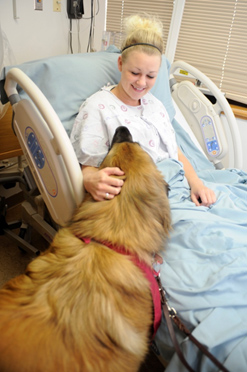Studies on therapeutic interventions involving animals have shown that participants reported reduced symptoms of anxiety disorders, depression, post-traumatic stress disorder, stress and blood pressure. Professionals have incorporated animals in therapy because they are important sources of comfort, companionship, and empowerment. Animals can help us recover from unpleasant life experiences, broken hearts, as well as enable us to function better in everyday life situations or tasks. You are provided with the animal that suits your preferences and needs. You can choose the animal as well as the settings where you would like therapy to take place.
Studies provide ample evidence that animals serve as excellent therapists, emotional supporters and assistants to direct movement in case of disabilities. Clinical trial conducted on children suffering from autism spectrum disorders showed improved outcomes after animal therapy. Animal therapy has also been effective in treating patients with disorders including: Schizophrenia, Down syndrome and Alzheimer’s. Therefore, interacting with animals generates positive results.
Do you qualify for animal therapy?
It’s not easy to decide whether you need an animal for therapy, because a lot of time, huge costs and resources go into looking after and maintaining the wellbeing of the animal you choose to take under your wing. You may want to have an animal as a constant companion and to stay in your presence all the time; however, not everyone can undertake the responsibility of looking after the animal. If you want to decide whether you can withstand the moods and attitudes of an animal, you could try animal therapy or pet ownership first.
Try spending a month in the company of an animal before heading straight on for the task. Contact a psychotherapist to guide you and determine whether you are responsible enough to have an animal for companionship.
There are several therapists, animal therapy programs, treatment facilities, and treatment groups that cater to the needs of patients and select the animals that are the most appropriate for treatment conditions. Experiments would help you decide how well you respond to animal therapeutic interventions, and how you interact with animals.
Healthcare providers train animals according to the needs of the patient, and select the animal that is most appropriate for treatment. If you don’t have access to animals, you could look for facilities in your state that could train animals for you. You would be able to locate an organization that can train animals that match your requirements.
Get in touch with a mental health professional to know if you are the right person to have an animal. Your therapist can decide best what kind of therapy you need, and whether you need an animal to improve your mental health issues. Seek help from your therapist in the training process or ask for a referral to a professional who trains animals according to requirements and could guide you through the therapeutic alliance. An expert can assess your interactions with an animal.
Animals need to be nurtured, taken care of and fed at scheduled times. If you feel you are up for the responsibility and you can take out time for your therapy animal, seek advice from a professional first. Evaluate whether you can dedicate the required amount of time and money to look after the animal.
For more information regarding emotional support animals or to determine if you would qualify to have your pet as an emotional support animal please visit www.touchesa.com or call 414-807-8934
